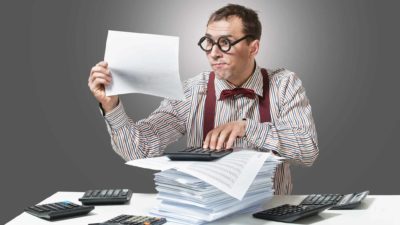Has there ever been a worse financial policy than giving people early access to up to $20,000 worth of their Super?
I guess it's possible.
I mean governments have done some silly things.
But this has to, at the very least, be a podium finish.
First, though, let's backtrack a little.
It's almost certain that the Coronavirus outbreak, and the resultant restrictions on movement and economic activity, will put Australia into recession.
(If we were really, really lucky, a very short downturn, and some lucky calendar timing could possibly save us from that fate, but it's remarkably unlikely.)
I have no beef with those restrictions. Maybe it's an overreaction. Maybe it's not enough. But unlike much of the rest of Australia, I'm neither a health nor public policy expert, so I'll defer to those who are.
And I'm a fan of the government's (slightly belated but) very welcome move to throw away the 'balanced budget' facade and get on with the task of minimising the economic damage, even if it means near-term fiscal deficits. The latter is much more easily fixed — and more easily borne — than the former.
At a time like this, as US fed official Neel Kashkari has said, what matters is 'speed' and 'size', not trying to be absolutely perfect. So while I would do some things differently, it's hard to argue with the broad brush strokes of the federal government's actions.
With two exceptions.
The first is the free kick for our airlines. As The Guardian described it:
"The Australian aviation industry will receive a $715m relief package, as the federal government waives a range of fees to help support the sector, reeling from the effects of the coronavirus and associated travel restrictions.
The package, announced on Wednesday, will see the government waive fees including aviation fuel excise, Airservices charges on domestic airline operations and domestic and regional aviation security charges.
The measures will be backdated to 1 February, resulting in an estimated reimbursement of $159 million for applicable charges already paid by domestic airlines."
Really? $715 million worth of measures? For what?
The planes are not (with few exceptions) flying. Two-thirds of the staff have been stood down until the end of May.
I'm not entirely sure who the $715 million relief package is helping.
But let's say it's necessary. Why is the money being handed over to two private businesses, in exchange for nothing but the promise to try to stay in business?
Surely, surely, the Australian people should have received something in return?
What should it be? I'm glad you asked:
Equity.
The Australian government should have been given shares in the airlines, in exchange for the money.
If the airlines go broke, we're no worse off than if the money had been just given to them.
And if they don't, the government can, at some future point, sell those shares to recoup most or all of the money.
Sounds fair, doesn't it?
But the airline bailout isn't even close, in terms of questionable policy, to the Super policy.
I want you to think about a 25 year old, who loses her job today.
It's a shattering blow. She probably has rent to pay. Or a mortgage.
Probably a car loan. Certainly bills. Maybe a family to support.
We should, as a society, help that person.
Now, the government has a heap of options, but let's consider two — the current policy, and a numerically equivalent alternative:
1. They can let the woman in question take out $20,000 of her Superannuation balance; or
2. They can pay an equivalent amount as a welfare payment.
Let's look at the impact, but in reverse order.
Adding $20,000 to the budget deficit is an extra cost to the taxpayer. How much? Well, the Australian government 10 year bond rate is currently 0.95%. So that's $190 a year. And when the economy recovers, it'll be paid off.
Let's assume it takes 10 years for that to happen — over the life of the bond, that's $1,900.
But what if we save the taxpayer that $1,900 and let her raid her Super instead.
Well, she'll work for another 42 years, assuming the retirement age stays at 67.
And let's assume an average 7% return, per annum, for her Super.
At that rate, $20,000 could compound to $340,000 by retirement.
Now, it's too simple to say that the government is trying to save itself $1,900 by costing her $320,000…
Actually, no it's not.
That's precisely what's happening.
While at the same time, giving the airlines the best part of three-quarters of a billion in free kicks and handing out sums of up to six figures to businesses.
No, I don't want this to become a partisan conversation.
I don't care who you voted for or who you wish was in The Lodge right now.
I just want to help you see that this policy — conceived as one of a range of emergency economic measures — is woefully (even if unintentionally) conceived, and will have consequences that echo through people's lives for more than 4 decades.
(More than 4? You bet. See, that $20,000 can be seen as the 'last $20,000' that would otherwise be in someone's Super account: the money they wouldn't need to touch until the rest was gone. And that might be at 75, 80 or 85. Left untouched until 85, for example, $20,000 would compound to $1.16 million!)
It's also somewhat ironic that the very time the stock market has fallen in a hole is the time people are considering selling shares and taking the money out — at probably the worst time for years, and in all probability near enough to a low point in the market.
I know people are, and will be, doing it tough over the next few weeks and months.
I don't blame anyone for looking at the potential of putting another twenty grand in the kick, to pay bills and to calm already-frayed nerves.
We, as a country, can still help those people.
It just doesn't need to be at the expense of their retirement.
If you truly, desperately need to tap your Super to get you through, I'm not going to condemn you. We all do what we have to do for ourselves and our families.
But unless you really, truly, need the cash, please do what you can to leave your Super alone. There are 340,000 reasons (and maybe more than 1 million) to resist.
If you know someone in that position, please share this with them, and talk to them about other options.
If you agree, please get in touch with your politicians and let them know.
And please, Prime Minister Morrison and Treasurer Frydenberg, give people a better option.
We can afford it, and they deserve it.
Fool on!








